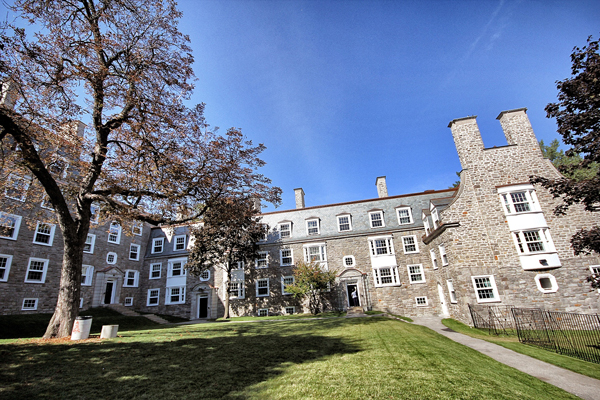
By Neale McDevitt
Ask anyone who has ever had renovations done to their home about what are their two favourite phrases and they’ll say “on time” and “on budget.” Ask them what phrases they hear least often and they’ll probably give you the same answer.
Which is why, when Douglas Hall residence opened its doors for business to some 190 students in late August, after being closed for more than a year for extensive renovations, Mathieu Laperle was so excited. “Not only were we on time, but we were actually under budget,” says Laperle, Director of Student Housing and Hospitality Services (SHHS). “It’s not often you can say that for construction projects of this scope.”
One of the major components in McGill residences’ $40-million deferred maintenance plan, the Douglas Hall renovation was projected to cost $15 million. Instead, when the sawdust had settled, the project came in some $400,000 under budget.
The project can be divided into three components – a complete overhaul of the building’s exterior; major interior renovations of bathrooms and the kitchen and dining areas, and a complete refurbishing of furniture in common areas and student’s rooms.
Douglas Hall had undergone very little maintenance work since it opened in 1937. As such, much of the exterior was in desperate need of attention. “We basically redid the envelope of the building,” says David Balcombe, Associate Director, Building and Facilities Operations, and the person who oversaw the project on the McGill end. “This meant replacing the slate roofs and flat roofs; making significant repairs to the masonry walls and chimneys; and replacing all the wood-framed windows.”
As well, the external lighting and light fixtures around the building were restored to the patrimonial look of Douglas Hall’s earlier days. Finally, the ventilation systems were upgraded and improved.
Inside, all the wood floors in the building were sanded and refinished. Bathrooms in common areas were retiled to replicate their original look and ventilation systems were upgraded. Even the card readers were upgraded, adding to the building’s security.
Finally, the kitchen and dining area benefitted from a major facelift. While much of the work involved bringing the equipment (such as the hood system) up to code, other changes will enhance the overall student experience. With the open kitchen and dining hall now on the same level, students will be able to talk to and interact with the chefs preparing their food.
“This renovation will give us a chance to provide better food, while being more efficient and saving energy,” says Laperle. “And with the chefs being able to interact directly with their customers, the overall dining experience is improved.”
Once all the structural renovations were finished, it was time to upgrade the furniture. “We replaced the furniture in all the students’ rooms and the common areas,” says Balcombe. “New desks, new beds, new dresser drawers.”
Laperle is quick to point out that the furniture – and most of the renovation work itself – came from local sources. “We are committed to working with local suppliers and you can see that commitment in the work done on Douglas Hall,” he says. “We used local businesses to do the exterior renovations, local suppliers for the furniture and local expertise for the renovation of the kitchen and some of the rooms in the building.”
For a project of this scope to be successful it requires the hard work and collaboration of many individuals and units, both inside McGill and from the outside. “There is so much behind-the-scenes work going on in a major project like this. To finish on time and under budget is proof of the professionalism of everyone involved.
“Douglas Hall is a beautiful heritage building and a major asset to McGill,” continues Balcombe. “These renovations will help preserve it for at least another 100 years.”
